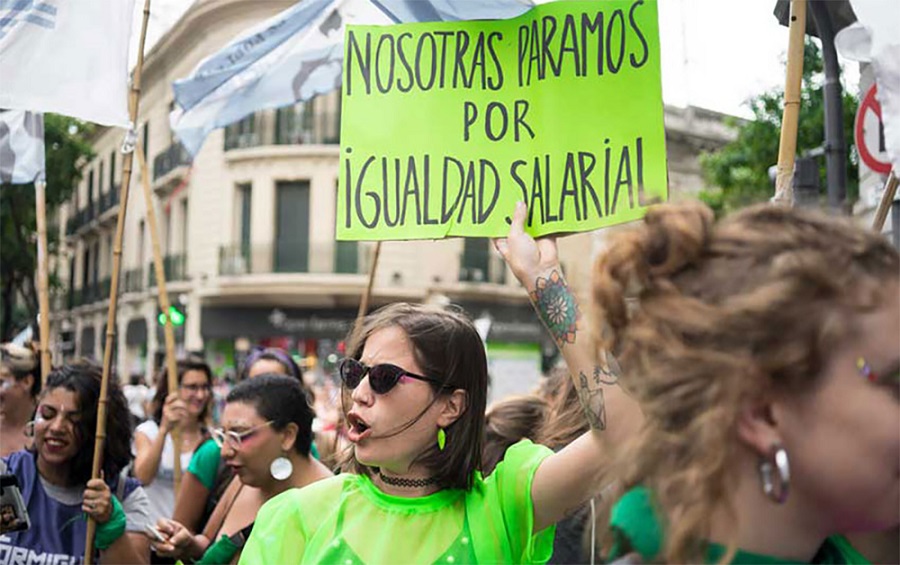
This Monday, September 18, is International Equal Pay Day. This is how the United Nations Organization defined it 3 years ago, in 2020.
According to the UN, “International Equal Pay Day represents constant efforts to achieve equal pay for work of equal value.” In its manifesto it recognizes that “in all regions, women are paid less than men, with a gender pay gap estimated at around 20% globally. Gender equality and the empowerment of women and girls remain stagnant due to the persistence of historical and structural inequalities in power relations between women and men.”
The objective, according to the organizations that promote the initiative, is “to achieve equal remuneration.” To a large extent it addresses tasks of “awareness-raising” and “dissemination” about the situation of working women. There is compelling data, such as:
But what is the wage gap? As economist Monica Arancibia explains, “it is the inequality of salaries based on sex, and it is measured as the difference between the average salaries of men and women, as a percentage of men’s income.” In other words, the entire economically active population and its income are taken into account, not individual cases in certain positions.
This gap is related to access to the lowest paid jobs, with a greater degree of informality, or to the lowest categories, among other factors.
Can capitalism achieve equal pay?
The complaints are forceful and the will of many of the social and feminist organizations that promote the initiative is beyond discussion. The problem is that the UN itself recognizes in the initiative’s inaugural manifesto that “progress to reduce that gap has been slow. While equal pay for men and women has been widely supported, its implementation in practice has been difficult.”
The question is why? and the first answer must be found in “practice” and the proposal of the UN itself.
To achieve its objectives, in addition to establishing the anniversary, it has founded the “Equal Pay International Coalition (EPIC).” It is directed by the ILO (International Labor Organization), UN Women and the OECD (Organization for Economic Cooperation and Development). EPIC “helps governments, employers, workers and their organizations make concrete and coordinated progress towards achieving this goal.”
In other words, the main hope is that business chambers, as well as governments (including many imperialist states) “coordinate” with workers and their organizations to improve their situation. Among the proposals, there are even booklets on “How companies can promote the international coalition for equal pay.”
The goal is good, but the path to achieve it is a contradiction in itself. It is the companies that benefit from the wage gap between women and men; also the capitalist states and their “public policies” that have women and girls from working families as their main adjustment variable; Union bureaucracies are complicit in this fragmentation and discrimination. How could they solve the underlying problem?
In reality, the situation for women has worsened since 2020, when International Equal Pay Day was established. As Andrea D’Atri, a leader of the PTS-Frente de Izquierda and the Pan y Rosas group, pointed out recently in a television interview: “what happened with the pandemic is that the decline of women in the labor market is enormous. If we thought that women were making progress in terms of labor insertion and rights, the setback that occurred with the pandemic took us a lot backwards.” This situation is expressed, D’Atri denounces, “in that ECLAC (Economic Commission for Latin America and the Caribbean), with the Ministry of Economy, made a report that indicates that 73% of these women who are heads of household, but “Who have precarious work, that is, those who have work without rights, without bonuses, without vacations, without rights to unionize, go into debt every month to pay for food and basic services, the minimum for survival.”
In Argentina the situation continues to worsen, regardless of the creation of the Ministry of Women or the Government’s story. According to a report from the General Directorate of Labor Studies and Statistics of the Ministry of Labor, it was revealed that in 2022 the difference reached its maximum point in the last decade: 27%. And everything indicates that it continued to get worse, precisely because women are the ones who have the worst jobs: they are more among informal, unregistered, social programs and not to mention unpaid care or reproduction tasks.
The UN initiative is based on a reality: the wage gap (and in living conditions) and the need to demonstrate it. The problem is that these initiatives, where some companies and capitalist States wash their face, do not lead to real change. As D’Atri also analyzes in an article in the Semanario Ideas de Izquierda, one of the explanations is precisely the objective of these policies: “in the face of a feminism that was also another emergent of these processes of social and political radicalization, the objective was to establish a series of agencies and organizations that would act as mediators between the mobilized women and the State, to contain them, divert them from a possible more radicalized path, assimilate them to the status quo.”
There he also raises the underlying problem, which these initiatives cannot solve: “what the capitalist State cannot do without attacking its own character as an institution of domination of one class over another, is liquidate the private property of the means of production.” which is based on the exploitation of wage labor and radically eliminate the privacy of the free work of reproduction of the labor force carried out by women in the domestic sphere.”
There is the explanation of the salary and working conditions of women.
That is why the key is to organize, together with all the exploited, to fight for equal pay for equal work. But also, in the heat of these struggles, to end this system of exploitation, patriarchal and sexist. That day you can really “celebrate” International Equal Pay Day.
Source: www.laizquierdadiario.com

